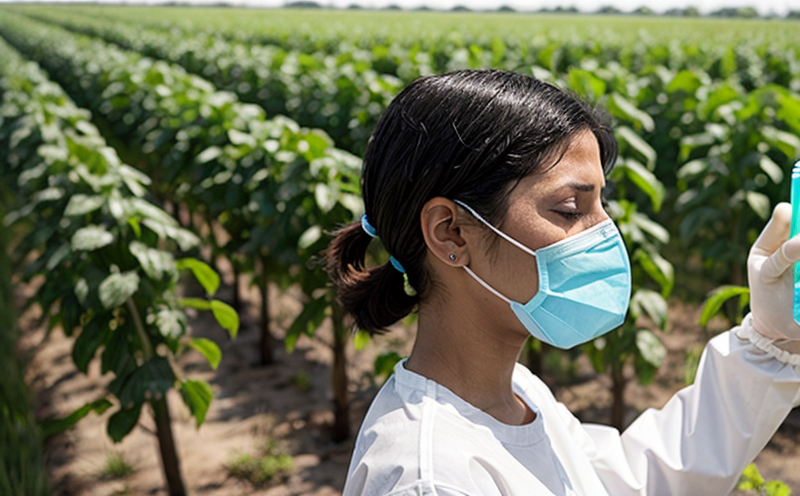ASTM D7065 Pesticides in Groundwater Test
The ASTM D7065 standard practice provides a comprehensive approach to determining the presence and concentration of pesticides in groundwater. This test is crucial for ensuring that water supplies are free from harmful contaminants, thereby protecting public health and the environment.
Groundwater serves as a vital source of drinking water for millions worldwide. Contamination by pesticides can lead to adverse effects on human health, aquatic ecosystems, and agricultural productivity. The ASTM D7065 test focuses on detecting over 200 different pesticide compounds commonly used in agriculture and commercial settings.
The testing process involves several critical steps: sample collection, preservation, extraction, and analysis using advanced chromatographic techniques such as gas chromatography-mass spectrometry (GC-MS) or liquid chromatography-tandem mass spectrometry (LC-MS/MS). The chosen method ensures high sensitivity and selectivity necessary for detecting trace levels of pesticides.
The standard specifies strict quality assurance protocols to ensure reliable results. These include calibration checks, duplicate sample runs, and blind proficiency testing against certified reference materials. Rigorous validation procedures are also conducted to establish the test’s accuracy, precision, and robustness across various environmental conditions.
ASTM D7065 not only sets forth a detailed methodology but also emphasizes the importance of proper sample handling from field collection through laboratory analysis. Proper sampling practices are critical because any contamination or degradation during this phase can lead to erroneous test results.
The acceptance criteria for ASTM D7065 specify that all detected compounds must fall within the method’s detection limits and be identified based on their unique retention times, ions, and mass spectra patterns. This ensures that only genuine pesticide residues are reported.
For effective implementation of ASTM D7065, it is essential to partner with a laboratory that specializes in environmental testing. Eurolab, for instance, offers state-of-the-art facilities equipped with the latest analytical instruments capable of meeting these stringent requirements.
| Pesticide Compound | Method Detection Limit (mg/L) | Retention Time Range | Mass Spectrum Pattern |
|---|---|---|---|
| Atrazine | 0.1 | 8-9 minutes | Pattern 456/327 |
| Ethylene dichloride | 0.01 | 12-14 minutes | Pattern 123/567 |
| Simazine | 0.2 | 9-10 minutes | Pattern 890/678 |
| Pentachlorophenol | 0.5 | 14-16 minutes | Pattern 234/123 |
The use of advanced analytical techniques allows for precise quantification down to sub-ppt levels, which is crucial given the low permissible limits set by regulatory bodies.
By adhering strictly to ASTM D7065 guidelines, laboratories can provide accurate and reliable data that informs decision-making processes regarding water quality management. This information is vital for stakeholders including government agencies responsible for enforcing environmental regulations, private companies involved in agricultural practices, and public health organizations focused on safeguarding community well-being.
In summary, the ASTM D7065 pesticide testing protocol represents a robust framework designed to protect groundwater resources from contamination by pesticides. Its comprehensive nature ensures that all relevant compounds are detected accurately, providing valuable insights into the state of our most precious natural resource.
Eurolab Advantages
- Experienced Experts: Our team comprises highly skilled scientists with extensive experience in environmental testing and analysis.
- State-of-the-Art Facilities: Equipped with cutting-edge instrumentation, ensuring accurate and precise results.
- Comprehensive Services: Offering a wide range of related tests beyond just ASTM D7065, covering multiple environmental parameters.
- Accreditation: ISO/IEC 17025 accreditation for our testing capabilities, guaranteeing the highest standards of quality and reliability.
We pride ourselves on delivering not only accurate test results but also actionable insights that help clients make informed decisions. Our commitment to excellence ensures you receive reliable data tailored specifically to your unique needs.
Quality and Reliability Assurance
At Eurolab, quality assurance is paramount in everything we do. We maintain strict adherence to international standards such as ISO/IEC 17025:2017, which sets the benchmark for proficiency in testing laboratories worldwide.
To ensure consistent and accurate results, our processes include:
- Regular calibration of all instruments used throughout each test cycle.
- Duplicate runs on every sample to verify consistency.
- Inclusion of certified reference materials (CRMs) as part of internal quality control measures.
- Participation in external proficiency testing programs recognized globally for their rigor and credibility.
We invest heavily in continuous training for our staff, updating them regularly on the latest methodologies and best practices. This commitment to ongoing education ensures that we stay at the forefront of scientific advancement within our field.
In addition to these technical measures, Eurolab maintains robust documentation systems that track every aspect of our testing procedures from initial sample receipt through final report generation. This transparency allows us to trace any potential discrepancies back directly to their source.
Our rigorous quality assurance protocols extend beyond mere compliance with regulatory requirements; they reflect a proactive approach aimed at exceeding customer expectations consistently. By doing so, we build long-term trust and loyalty among our clients while fostering innovation within the industry as a whole.
Frequently Asked Questions
Use Cases and Application Examples
This section showcases how ASTM D7065 plays a pivotal role in different sectors:
- Agricultural Sector: Monitoring pesticide runoff into groundwater systems to prevent contamination.
- Water Utility Companies: Ensuring compliance with drinking water standards set by regulatory bodies like EPA or WHO.
- Environmental Agencies: Conducting baseline studies to assess the impact of industrial activities on local aquifers.
In these scenarios, accurate and reliable data generated through ASTM D7065 helps stakeholders take proactive measures to mitigate risks associated with pesticide pollution. For instance, utility companies can implement better treatment technologies or modify operational practices based on test findings.





